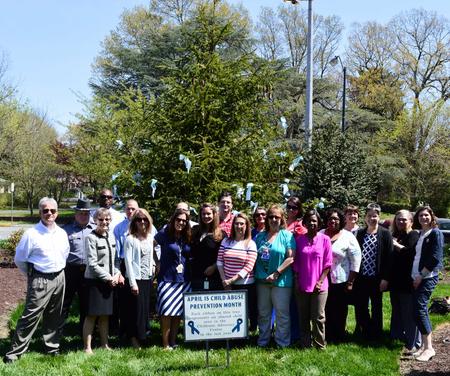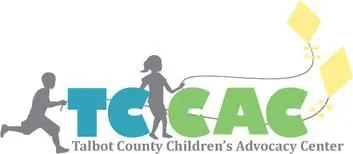
Children's Advocates Commemorate National Child Abuse Prevention Month
To commemorate April as National Child Abuse Prevention Month, children's advocates from organizations throughout the five-county region recently placed 61 blue ribbons, each representing a child served by the Talbot County Children's Advocacy Center (CAC) the past year, on a tree at the University of Maryland Shore Medical Center at Easton. The annual event is designed to heighten community awareness of the importance of families and communities working together to prevent child abuse and neglect and to promote the social and emotional well-being of children and families.
Volunteers who helped place ribbons represented the Talbot County Sheriff's Office, Easton Police Department, Maryland State Police, Talbot County Department of Social Services, Talbot County State's Attorney's Office, Evolution Mental Health and Trauma Services, Talbot Community Connections, University of Maryland Shore Regional Health at Easton, Kent County State's Attorney's Office, Kent County Children's Advocacy Center, Talbot County Department of Social Services Advisory Board, and Talbot County Children's Advocacy Center.
The CAC coordinates with local law enforcement and social services to offer comprehensive, multi-disciplinary responses to alleged incidences of child sexual and physical abuse. In partnership with the University of Maryland Shore Regional Health, the CAC provides non-invasive, forensic medical examinations in a secure location for cases in Caroline, Dorchester, Kent, Queen Anne's, and Talbot counties. Talbot Community Connections (TCC), a non-profit arm of the Talbot County Department of Social Services, has the mission to raise and distribute funds to answer unmet needs that are fundamental to the safety, security, health, and well-being of Talbot County's children and adults. These needs cross all economic levels. The funds raised provide help to abused children through the Talbot County Children's Advocacy Center (CAC) families in crisis, the unemployed and working poor, and disabled and frail elderly. TCC awards provided funds for respite care, prevention of evictions and utility disconnects, therapeutic activities for disabled foster care children, housing fuel, transportation, and a fatherhood program.
